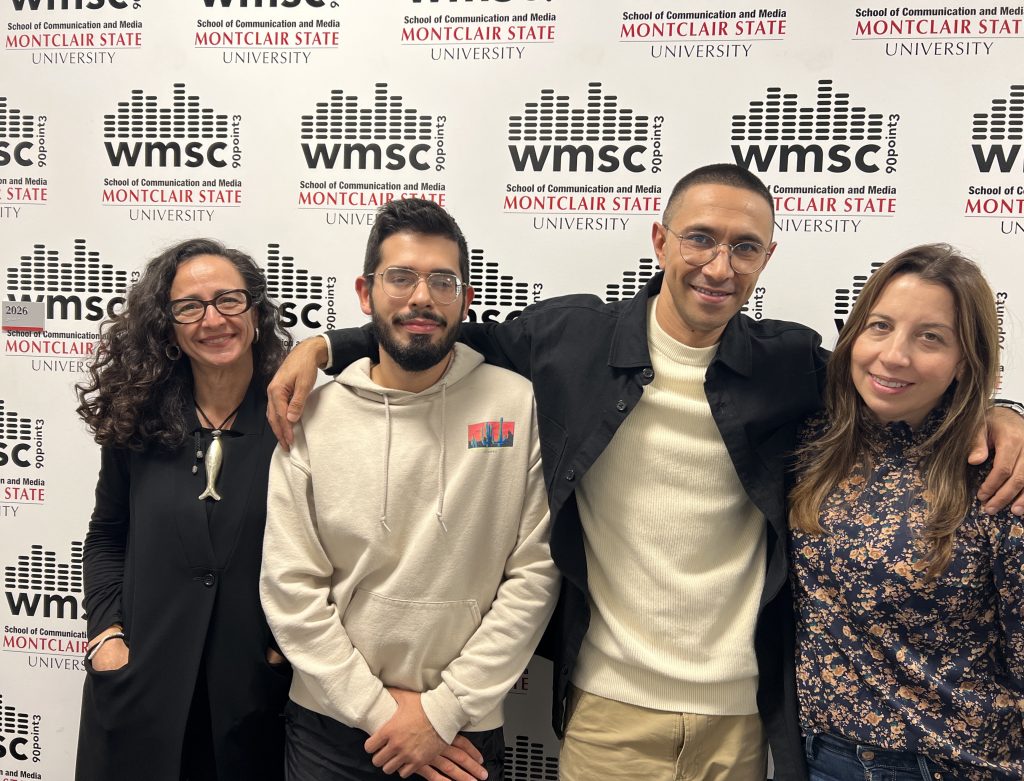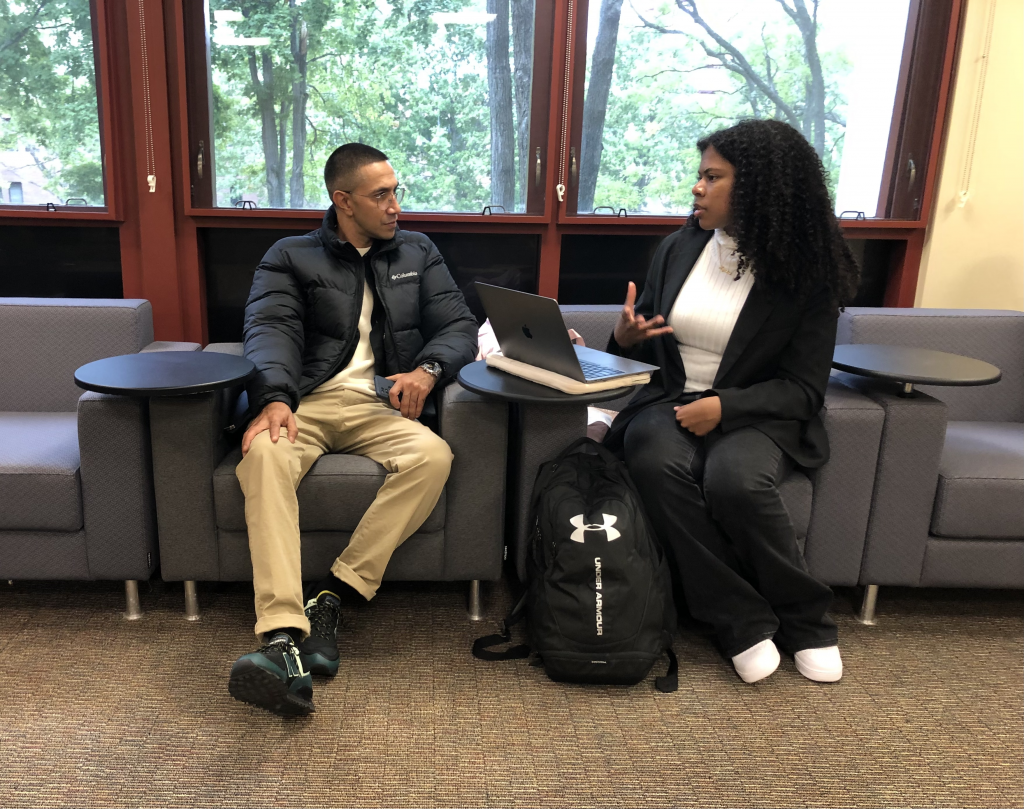Students from Different Disciplines and Language Backgrounds Interact with Afro-Italian Rapper Amir Issaa During Visit on Campus
Posted in: CHSS News, Inserra, Inserra Chair Events, Italian News and Events, World Languages and Cultures

Some time has passed since Afro-Italian rapper Amir Issaa presented a concert and workshop on campus but his personal story and powerful songs are still part of conversations among students of different disciplines and cultural/language backgrounds. An internationally renowned hip-hop artist who has creatively collaborated with several artists over the decades, Amir is also a passionate supporter of the BLM agenda in Italy and regularly holds rap writing workshops in schools, prisons, and colleges across the world. It is this combination of being an artist and having a concrete commitment to social justice that impressed the students who had a chance to interact with him in various forms on Oct. 3, 2022, as part of his Power to the Words/Potere alle Parole program, supported by the Inserra Endowment (Italian Program, WLC Department) included in the Hip Hop Residency Week of the Cali School of Music.
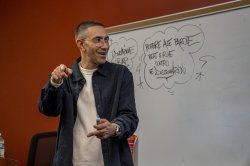
The workshop didn’t just give students the opportunity to learn how to write lyrics to a beat in Dr. Miele’s and Dr. Antenos’ classes. Amir himself turned into a very relatable teacher of some apparently anachronistic subjects in today’s academia: metric and rhetoric. As he explains, rap is all about quantification of syllables and individuation of rhymes, not to mention apt choices of rhetorical figures. Amir, in his unique blend of tradition and innovation, describes his approach as “raptorical” (rap and rhetoric): students listen and absorb complex structures without consciously realizing it, while they rap stories about themselves, often interlacing Italian, Spanish and English. As Vittoria Iellimo, a student in the Italian Teaching Certification, put it, “I never would have imagined myself writing a rap prior to the workshop: we were using rhyming techniques that helped us expand our vocabulary, or known words to express new emotions. Amir made the experience enjoyable and memorable.”
The concert held in Leshowitz Hall brought together students not just from the Italian program but across different disciplines on campus who are taking Italian Gen Ed and language requirement classes: additionally, a small contingent from Fordham University and Rutgers University joined members of the broader community including HS teachers and local residents, as well as students and faculty from the Cali School of Music. Equipped with lyrics in Italian and English, participants were able to appreciate the content of the songs, while singing along with Amir, who after the second piece had them stand up and forget about their chairs for the rest of the performance.
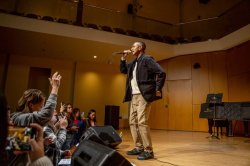
Different students had different favorites depending on their specific life experiences. Hana El Halawani, a major in Family Science and Human Development, liked I Am Not An Immigrant: “I related to this song because I am an Arab American Muslim. A lot of people think that just because I wear the hijab I was not born and raised in this country. The line that stayed with me is ‘I am not a terrorist, I am not a refugee.’ I relate because I have been called a terrorist.” Aldana Cerrate Banda, a major in Linguistics, identified with Amir’s statement in Game Over: ‘Like many others, I am a son of the street fighting for redemption, and I don’t want to make do with what I have – my parents already did.’ As she put it: “Growing up in very poor conditions has led me to have big expectations for my future. I had to leave my country in search of opportunities, and I will do everything I can to go further than anybody in my family ever has to achieve success.”
Amir is also an author: Vivo per questo (2017), his personal and artistic autobiography, is a testament to the challenges and imagination of the second generation in Italy (the book will be published in English by San Diego State University Press, edited by Clarissa Clò). Amir’s second book, Educazione Rap (2021), looks at rap as a poetic linguistic exercise as well as a shared experience of social impact across borders. For this work as an educator he was interviewed by WMSC, Montclair State University’s award-winning radio station led by general manager Anabella Poland (first on the right). Communication and Media Arts major Isaias Ramirez (second from the left) sat down with Amir to talk about his activism, music, and the power of rap. In the last bit of the interview, Amir rapped a cappella a few lines highlighting his belief in fighting with words rather than guns (see video below):
Once on stage, Amir mingled stories and anecdotes from his life with the performance of his songs. During the Q&A, the audience learned about his trajectory as an Afro-Italian struggling due to his father’s long-term prison conviction when he was a kid and the discrimination he experienced as a child of mixed race – his song La mia pelle/My Skin tells this story in incisive ways in collaboration with Somali-Italian writer Cristina Ali Farah- see English lyrics here).
This story came as a surprise to the students, who are often unaware of contemporary Italy’s racial and cultural diversity. Interestingly, they drew parallels with the experience of Italian Americans in very perceptive ways. Tori Sutera, remarked: “Amir’s story has definitely opened a new perception of Italy to me, especially as someone living in the U.S. with an Italian background. The Italian side of my family has surely faced their share of struggles and discrimination once arriving to America. However, Amir told stories of facing discrimination as an Italian living in Italy.” Students were displaced when they learned about Amir’s active role in the campaign for the reform of the blood-based Italian citizenship law which excludes the children of immigrants born on Italian soil until they turn 18, while it grants citizenship to Italian descendants around the world. Vittoria Iellimo commented: “It is so mind-blowing to know how I could obtain citizenship so easily since I am of Italian descent, while children of immigrants who were born and live in Italy do not have the opportunity to do so.”
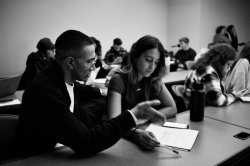
Journalism and Digital Media student Lynise Olivacce (journalist and photographer atThe Montclarion, pictured below) explored themes linked to the function of rap as therapy in Amir’s work both as a tool for self-expression, denunciation of social ills, and definition of a community of fellow artists across borders (see full interview). Amir expressed his connection to a whole tradition of U.S. rap, especially the East Coast one, but also articulated his own vision of rap rooted in Italy, with a social purpose, and as an occasion for enriching exchanges.
In fact, a story that stayed with the students is about Amir’s decision to change a word in the lyrics of his classic Questa è Roma, his own reading of the mythical capital from the perspective of working-class youth with mixed backgrounds. In line with the rap tradition of using real-life language, he included a term to refer to street walkers that is widely used, but was resented by a group of young feminists that Amir agreed to meet. They explained to him that the word “sex worker” is preferable. Since it was not working in terms of rhythm, Amir thought about dropping this reference altogether. Students were struck by this decision. Child Advocacy and Policy major Emily Chargo noted: “It amazes me that he was so courteous and changed the lyrics not to offend people,” while Francesco Amore, a major in Public and Professional Writing, remarked that “instead of being a follower, accepting what is normal in rap music, Amir came across as a leader really thinking about how to describe women as a rapper.”
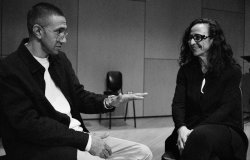
Dr. Teresa Fiore (Inserra Chair, pictured above) embraced the program as part of a mini-tour Amir presented in the states of NJ, NY and PA, and designed it so that it would be able to reach students well beyond the specific field of Italian, leveraging the multi-layered meanings of Amir’s raps to address anti-racism and the inclusion of diverse voices. “I have organized almost one hundred programs on campus over the past decade or so” – she remarked – “and hosted the most diverse artists fully committed to their art, but I have rarely seen such sustained dedication in the course of a non-stop marathon of eight hours on campus during which Amir met informally with faculty to plan the program, guided students through the creation of rap lyrics, shared stories with radio hosts and student journalists as part of engaged interviews, and then rapped on stage for over an hour getting the whole audience standing and singing along. It is a testimony to an agenda which is artistic and political at once, and that foregrounds human relationships and lived experiences.”
Montclair State University had already hosted Amir Issaa as part of an online program organized by Dr. Antenos (2021 Coccia Institute Teaching Symposium titled “Do You Speak Global? Intercultural Communicative Citizenship in the Italian Classroom”) before this past October’s in-person visit: we look forward to having him again for new initiatives in the future! Torna presto, Amir, with your scialla (it means “cool” or “chill” in Italian slang, as a famous song of his recites)!

